Iran Issues Death Penalty For Attacker Who Killed Two Clerics
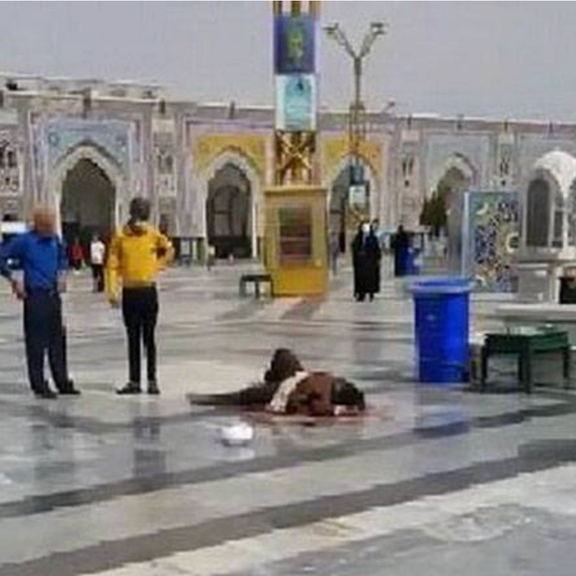
A court in Iran has sentenced a man to death for killing two clerics and wounding a third in a knife attack at a holy Shi'ite Muslim shrine in April, the judiciary said on Tuesday.

A court in Iran has sentenced a man to death for killing two clerics and wounding a third in a knife attack at a holy Shi'ite Muslim shrine in April, the judiciary said on Tuesday.
"The revolutionary court sentenced him to death ... and his lawyer has appealed. The case has been sent to the Supreme Court," judiciary spokesperson Masoud Setayeshi told a news conference carried live on a state-run website.
Officials said the attacker was Abdullatif Moradi, a 21-year-old ethnic Uzbek from Afghanistan with radical Sunni views. He was arrested after the stabbings at Iran's largest Shi'ite Muslim religious complex in the northeastern city of Mashhad.
Top officials and clerics had reacted strongly to the incident and called for a speedy trial in the case.
Attacks on clerics and government officials have been rare in Iran after authorities tightened security measures and cracked down on opposition groups following a string of attacks and bombings that killed dozens of officials and clerics following the 1979 Islamic revolution.
However, a senior conservative cleric was slightly hurt after being attacked by a man with a knife after Friday prayers last week in the central city of Isfahan.
There have been weeks of unrest in Iran after a jump in food prices and amid public anger with government leaders and powerful clerics over a deadly building collapse last month that was widely blamed on corruption and lax safety measures.
With reporting by Reuters
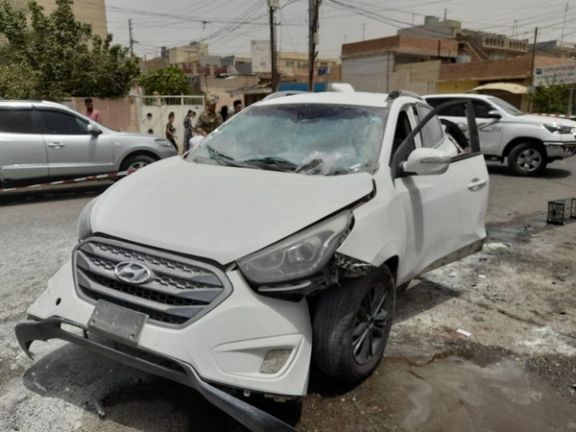
A senior member of the Organization of the Iranian Kurdistan Struggle has accused the Islamic Republic of being behind an assassination attempt on fellow fighter Akbar Sanjabi.
Shoresh Haji, a member of the governing committee of the opposition group – known as Khabat that is the Kurdish word for "struggle" -- told Iran International on Tuesday that the former political prisoner, 49, was injured when a bomb that was attached to his car detonated in Erbil, the capital of the Kurdistan Region in Iraq on Monday.
He called the attack a terrorist act, and called on the Iraqi Kurdistan Region security agencies to conduct an extensive investigation into the assault.
The political activist, who was severely injured in the left leg and was taken to Erbil’s Emergency Medical Center, had been sentenced to life in prison by Iranian authorities for membership in the Albania-based opposition group Mujahedin-e-Khalq (MEK) organization. While on a temporary leave, Sanjabi left the country and settled in Erbil.
In 2021, two political activists and members of the Kurdistan Free Life Party (PJAK) and the Democratic Party of Iranian Kurdistan (KDPI), Behrouz (Rebin) Rahimi and Musa Babakhani, were assassinated in the cities of Sulaimaniyah and Erbil.
Although the Islamic Republic has not claimed responsibility for any of these assassinations, their respective parties have blamed the Iranian government for the attacks.
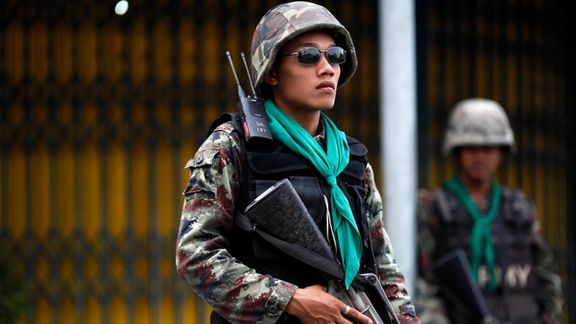
Following warnings that Iran was planning attacks on Israeli citizens in various parts of the world, Thailand’s police have are on high alert to find the Islamic Republic’s agents.
A police source told the Bangkok Post on Monday that the Royal Thai Police (RTP) has issued a secret order to officers across the country to keep an eye out for spies from Iran believed to be in the region after one was arrested in Indonesia last year.
According to the source, security agencies are closely monitoring the movements of Iranian nationals and gathering intelligence about some Shiite Thai Muslims who are suspected to be working as the Islamic Republic’s agents.
The source said the order cited an incident in May last year when Indonesian authorities were tipped off that a man named Ghassem Saberi Gilchalan arrived in the country carrying a fake Bulgarian passport.
He was arrested just before departing for Qatar, and was sentenced to two years in jail. Police found that he entered the country more than 10 times using false papers and had 11 mobile phones with the names of some Thai Muslims saved on them.
Following interrogations, Gilchalan confessed that he had been given several assignments by a former Iranian diplomat in Malaysia to act as a spy both there and in Indonesia several times, the latest of which involved lobbying Indonesian authorities to release the Iranian-flagged MT Horse oil tanker apprehended there January last year.

In May, an Israeli informed source told Iran International that security measures are tight around the Israeli embassy in the Indian capital New Delhi reportedly over a serious possibility of an attack by Iran-backed elements.
Late in May, President Ebrahim Raisi said Iran will “definitely” take revenge for the spectacular assassination of Revolutionary Guard Qods (Quds) Force colonel Hassan Sayyad-Khodaei in Tehran. Sayyad-Khodaei, who Israeli media say was the acting commander of an elite Qods Force unit, Unit 840, was shot dead behind the wheel of his car by two gunmen who fled the scene on a motorbike.
A few days later, Fars news website in Iran affiliated with the IRGC published an article profiling several Israeli businesspeople, using thinly veiled threatening language.
Moreover, conflicting reports are still circulating about the death of Iranian aerospace scientist Ayoob Entezari -- who held a PhD in mechanical and aerospace engineering -- with some calling it an assassination and government saying he died of food poisoning.
Reports about Entezari’s fate came a day after Iran confirmed the death of a colonel from the Quds Force, Ali Esmailzadeh of the Islamic Revolutionary Guard Corps. Iranian government and IRGC media said that Col. Esmailzadeh died “in an incident in recent days” at his home without mentioning any details after Iran International quoted sources in Iran as saying that the IRGC killed him over suspicions of espionage.
Last week, Israel issued a warning to citizens traveling or planning to travel to Turkey that they could be targeted by Iranian operatives seeking to avenge the recent assassination. The National Security Council explicitly identified “Iranian terrorist operatives” as being the source of the threat to Israelis in Turkey and nearby countries. Israel’s Channel 12 news reported on Sunday that Israel is considering expanding the travel warning to additional countries.
Early in May, a short audio recording was published by Israeli media with a photo of a man introduced as Iranian national Mansour Rasouli, 52. In the audio recording, Rasouli says he was sent to Turkey by the Revolutionary Guards (IRGC) to establish an operational network to assassinate an Israeli diplomat in Istanbul, a Germany-based US general, and a journalist in France.
Later in May, Israel’s security agency Shin Bet uncovered an alleged plot by Iranian intelligence to lure Israeli academics and former defense officials to travel abroad in order to kidnap them. The Iranian operatives used the stolen identities and relevant cover stories in an attempt to gather intelligence about Israelis and to invite them to locations abroad -- some under the guise of a conference -- in order to abduct or harm them.
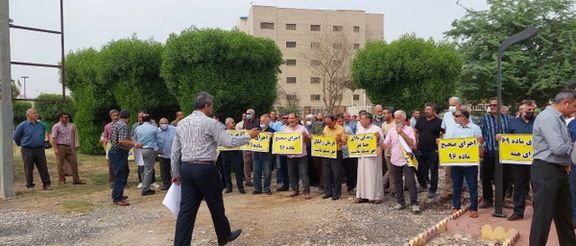
Iranian retirees held demonstrations Monday in several cities across the country to protest the meager rise in their pensions while the inflation rate is hovering over at over 40 percent.
The pensioners took to streets in the capitals of many provinces such as Tabriz, Gilan, and Kermanshah, while several cities across the southwestern oil-rich Khuzestan province, including Ahvaz, Dezful, Abadan, and Shushtar, were also scenes of similar protests.
The enraged protesters chanted slogans such as “Death to Raisi” and "Shame on you incompetent minister”, against the government and “empty promises” by authorities.
Retirees are demanding pension increases in par with rising prices of essential foods, saying that the current payments are not in line with decrees by the Supreme Labor Council, which had stipulated a 38-percent increase in the minimum wage.
The protests occurred as the government spokesman Ali Bahadori Jahromi said in a tweet on Sunday that the minimum wage for retirees covered by the Social Security Organization has risen by 57 percent, calling it “one of the largest increases in 20 years and nearly 20 percent above the official inflation rate.”
With food prices rising faster after four years of United States’ ‘maximum pressure’ sanctions, Iranian workers and retirees and workers have been holding regular protests or strikes to demand higher salaries.
Moreover, the collapse of a ten-story Metropol building in Abadan in May has sparked anti-government rallies that have spread to other cities in the southwestern Khuzestan province and elsewhere.
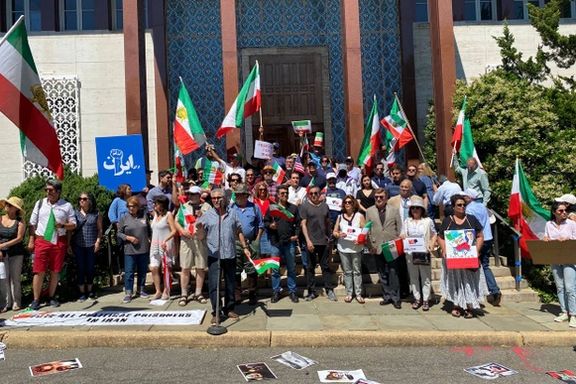
Iranian expatriates in the United States and Canada held gatherings in Washington DC and Toronto on Sunday to express support for popular anti-regime protests in Iran.
The Washington protest was held at the former building of the Iranian embassy and called by dissident singer-songwriter Arash Sobhani, a blues musician who has been an active advocate of human rights and democracy in Iran and has delivered speeches about Iranian social issues in various universities, including Harvard, Stanford, and University of California Irvine.
During the event, Sobhani performed some of his original works, which are usually themed around the cultural and political issues in the Islamic Republic, as well as some cover songs about Iran, which were accompanied by the participating crowd.
The gathering in Toronto was organized by Hamed Esmailioun, who is the flagbearer for the victims of the downing of Ukrainian Airlines Flight PS752 in January 2020 by the Revolutionary Guard, where he himself lost his wife and daughter.
"Iran is ruled by the turban-wearing criminals and bloodthirsty revolutionary guards," Esmailioun said during his speech at the demonstration.
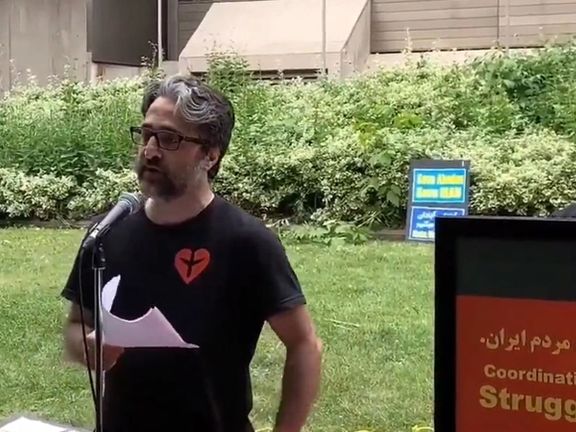
In both gatherings, people expressed solidarity with the people of Abadan, whose mourning ceremonies for the victims of the collapsed ten-story Metropol twin towers in May have turned into anti-government protests and spread to other cities of the southwestern Khuzestan province as well as other cities across the country.
“Although we tremble from sorrow but abound with anger; our heart is with you Abadan and we will not let them trample on the truth,” Esmailioun added.
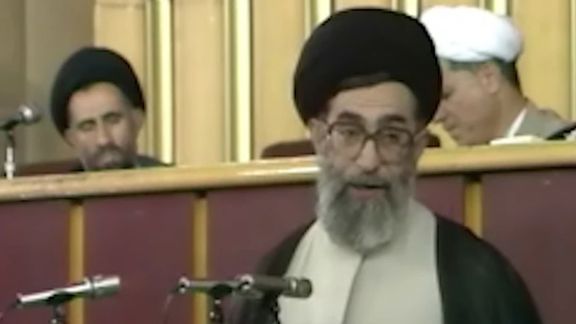
Supreme Leader Ali Khamenei's website has published an audio tape to show that Islamic Republic’s founder Ruhollah Khomeini endorsed him as Iran's next leader.
Khamenei says in the 3:30-minute tape that in 1989 when Khomeini was determined to oust his deputy Ayatollah Hosseinali Montazeri, a group of top leaders held a private meeting with the dying leader and told him that without Montazeri Iran will have no leader after his death, but Khomeini turning to Khamenei said: "You be the next leader!"
This corroborates in part with quintessential kingmaker Akbar Hashemi Rafsanjani's anecdotal account of Khmomeini's suggestion that Khamenei can be the Islamic Republic's next leader. Rafsanjani made the comment to encourage Assembly of Expert members to vote for Khamenei. All but 14 of them did in fact vote to elect Khamenei in June 1989.
The website says the contents of the tape is being revealed for the first time, but journalists in Tehran knew about it for a long time. The voice in the tape is that of Khamenei, telling someone about what transpired in the meeting with Khomeini. His website says the audio was recorded at a private meeting, but it does not say where and when.
In the recording, Khamenei says others who were present in the meeting with Khomeini were then- Prime Minister Mir Hossein Mousavi, Chief Justice Abdolkarim Mousavi Ardebili, Khomeini's son Ahmad and Majles Speaker and deputy chairman of Assembly of Experts Rafsanjani. At the time Khamenei was Iran's President.
Election as Supreme Leader
"I did not take it seriously at all," says Khamenei in the tape, adding a few more times that he never took Khomeini’s suggestion it seriously. "And I was determined not to accept this position if they insisted after Imam’s death," Khamenei continued.
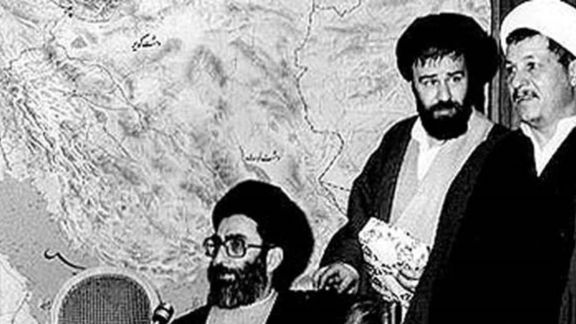
In fact, when the Assembly of Experts was discussing his nomination as the next leader, Khamenei delivered a brief speech in which he said he was against the idea of his nomination "because of religious and legal problems," apparently alluding to the fact that he was not a religious "source of emulation" at the time which was a key requirement for the post.
He said on the election day, a day after Khomeini's death: "One should pity a nation who would have him as their leader. My words will never be as influential as those of the Imam." Nonetheless, Rafsanjani insisted that Khamenei is the nation's best choice for a leader and added more anecdotal evidence about why Khomeini liked Khamenei to be his heir.
In fact, in 33 years since Khamenei’s ascendance to the top of leadership, his critics have always pointed out his weak claim to be Supreme Leader. Immediately after Khomeini’s passing, top clerics were discussing the formation of a leadership council, until Rafsanjani engineered Khamenei’s election in the Assembly of Experts.
Timing for releasing tape
The fact that Khamenei now publishes the tape to convince the nation of Khomeini's endorsement is significant. A series of nationwide protests since 2017 during which demonstrators called for his death or resignation, as well as the country's backbreaking economic crisis that has led to more protests, acknowledgement by officials that young Iranians no longer care for the values propagated by Islamic Republic, and Iran's weakness in terms of security while Israeli agents steal its secrets and attack Iranian nuclear sites, show that Khamenei's career is at its weakest point since 1989. These events have eroded his self-confidence, as many observed after his speech on June 4.
It is this weakness that has probably persuaded him to produce some evidence that Khomeini endorsed his leadership. However, Khomeini’s daughter Zahra Mostavafi and Abdolkarim Mousavi Ardabili who was present in the meeting with Khoemeini have said in the past the founder of the Islamic Republic did not single out Khamenei as possible Supreme Leader, and he referred to all three clerics present in the meeting as his possible heirs.